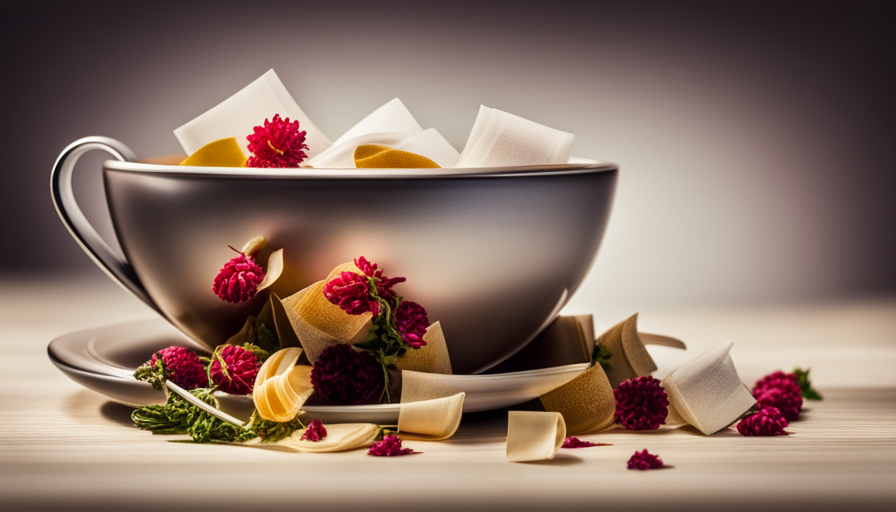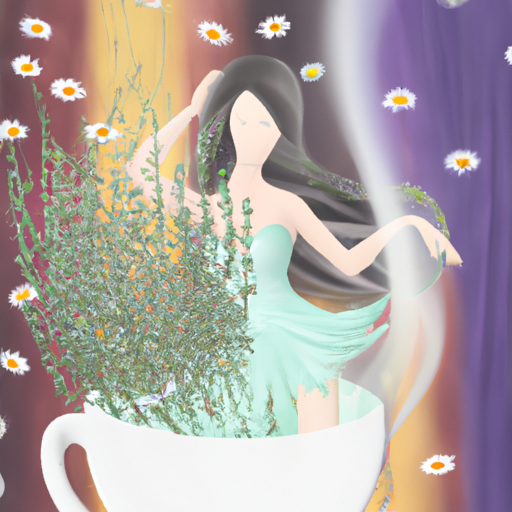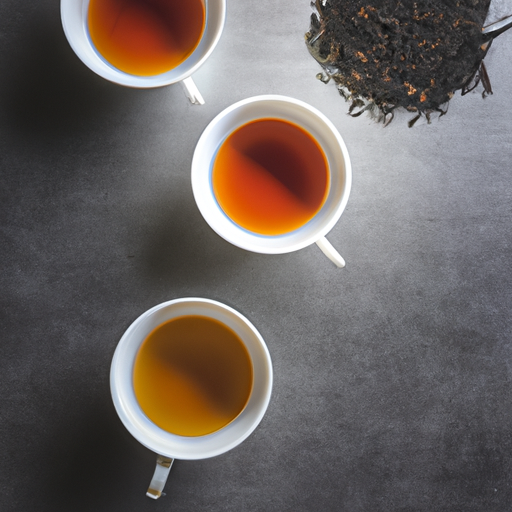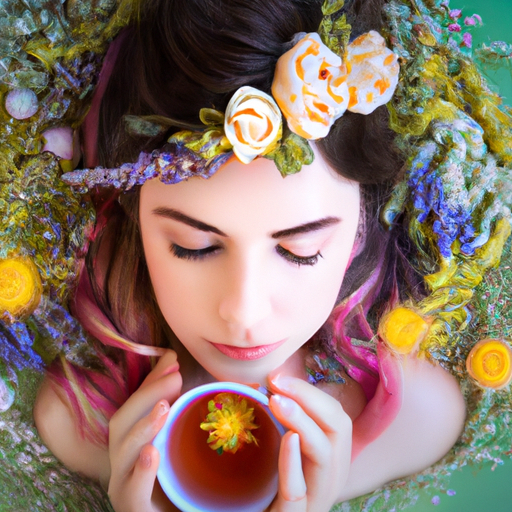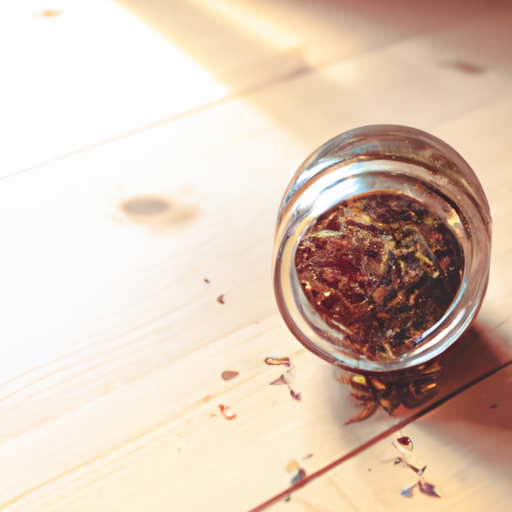Have you ever thought about how many cups of herbal tea are too many?
Well, I’ve got some fascinating information that will help you find the right balance. As a tea enthusiast, I’ve always been curious about the effects of excessive tea consumption.
In this article, we’ll explore the various types of herbal tea and their benefits, while also delving into the potential risks of overindulging. But that’s not all – we’ll also uncover the role of caffeine in herbal tea and discuss the side effects of specific blends.
Additionally, I’ll share with you some telltale signs that indicate you may be consuming too much herbal tea. So, if you’re ready to dive into the world of tea and discover the perfect balance for your tea intake, keep reading.
Moderation is key, and with the right knowledge, you can enjoy your herbal tea without any worries.
Key Takeaways
- Herbal tea offers a wide range of flavors and potential health benefits, but it is important to consume it in moderation.
- Excessive consumption of herbal tea can lead to dehydration, electrolyte imbalance, and disrupted sleep patterns.
- Different herbal teas have different effects on the body, and individual tolerance and health conditions should be considered before consuming large amounts.
- Consulting with a healthcare professional can provide guidance on appropriate herbal tea intake based on individual needs and concerns.
Types of Herbal Tea and Their Benefits
Did you know that there are many types of herbal tea, each with its own unique benefits? From soothing chamomile to invigorating peppermint, herbal teas offer a wide range of flavors and potential health advantages.
Let’s explore some of the most popular types of herbal tea and how to brew them for maximum benefits.
One common herbal tea is chamomile, known for its calming properties. It has a mild, floral flavor and is often enjoyed before bedtime to promote relaxation and improve sleep quality.
Another popular choice is peppermint tea, which has a refreshing taste and can aid in digestion. It’s perfect for soothing an upset stomach or relieving bloating.
If you’re looking for a tea with a fruity twist, consider trying hibiscus tea. It has a tangy flavor and is rich in antioxidants that may help reduce high blood pressure.
On the other hand, ginger tea offers a spicy kick and can help alleviate nausea and inflammation.
To brew herbal tea for maximum benefits, start by boiling water and then letting it cool slightly before adding the tea leaves or tea bags. Steep the tea for about 5-10 minutes, depending on your preference. Remember to cover the mug or teapot to prevent the beneficial compounds from escaping through steam.
As we delve into the recommended daily intake of herbal tea, it’s important to understand the potential risks of excessive consumption.
Recommended Daily Intake of Herbal Tea
Surpassing the recommended daily intake of herbal tea is like taking an enchanting journey through a tea-filled paradise, but it may lead to uncharted territories for your body. While herbal tea offers numerous health benefits, it’s important to consume it in moderation to avoid potential risks.
Here are a few key points to consider regarding the recommended daily intake of herbal tea:
- The recommended daily intake varies depending on the type of herbal tea and individual factors such as age, overall health, and any pre-existing medical conditions.
- Generally, it’s advised to limit herbal tea consumption to 2-3 cups per day to reap its maximum health benefits.
- Drinking herbal tea in excessive amounts may lead to unintended side effects, such as digestive issues, caffeine sensitivity, or interference with certain medications.
- It’s crucial to listen to your body and consult a healthcare professional if you have any concerns about your herbal tea intake.
Exceeding the recommended daily intake of herbal tea can potentially pose risks to your health.
In the following section, we’ll explore the potential risks of excessive herbal tea consumption and how to avoid them.
Potential Risks of Excessive Herbal Tea Consumption
Excessive consumption of herbal tea can potentially lead to dehydration and electrolyte imbalance. This is because herbal teas, especially those with diuretic properties, can increase urine production and lead to fluid loss.
Additionally, certain herbal teas can interfere with medications, either by reducing their effectiveness or by increasing their side effects. It’s important to be aware of any potential interactions between herbal teas and medications.
Lastly, some individuals may experience allergic reactions or sensitivities to certain herbal teas, which can manifest as skin rashes, itching, or difficulty breathing. It’s advisable to be cautious and consult with a healthcare professional if any adverse reactions occur.
Dehydration and Electrolyte Imbalance
Dehydration and electrolyte imbalance can occur if you consume an excessive amount of herbal tea. It’s important to be aware of these potential risks and take steps to prevent dehydration.
Here are four reasons why excessive herbal tea consumption can lead to dehydration and electrolyte imbalance:
- Herbal teas often have diuretic effects, causing increased urine production and fluid loss.
- Some herbal teas, such as those containing caffeine, can increase fluid loss through increased urination.
- Drinking too much herbal tea can lead to decreased intake of other hydrating beverages, such as water.
- Herbal teas may not provide sufficient electrolytes, which are essential for maintaining fluid balance in the body.
To prevent dehydration, it’s important to drink plenty of water and consider electrolyte supplementation if needed.
Moving on to the next section, excessive herbal tea consumption can also interfere with medications.
Interference with Medications
Taking an abundance of herbal tea may potentially disrupt the effectiveness of certain medications. Interactions with prescription drugs can occur when certain compounds in herbal teas interfere with the metabolism or absorption of medications. This can lead to either a decrease in the medication’s effectiveness or an increase in its side effects.
For example, herbal teas like St. John’s Wort can reduce the effectiveness of medications like birth control pills, antidepressants, and blood thinners. It’s important to be aware of these potential risks of herbal tea consumption, especially if you’re taking any prescription medications. Always consult with your healthcare provider before adding herbal tea to your daily routine to make sure it won’t interfere with any medications you’re currently taking.
Moving on to the next topic, allergic reactions and sensitivities can also occur with herbal tea consumption.
Allergic Reactions and Sensitivities
Allergies and sensitivities can arise when consuming herbal tea. Some individuals may experience allergic reactions or sensitivities to certain herbs or ingredients found in herbal tea. Common symptoms of an allergic reaction include skin rashes, itching, swelling, or difficulty breathing. It is important to be aware of any known allergies or sensitivities you may have before consuming herbal tea. To help you identify potential allergens in herbal tea, here is a table listing some common herbs and their potential allergic reactions or sensitivities:
| Herb | Potential Allergic Reactions/Sensitivities |
|---|---|
| Chamomile | Ragweed allergy, allergic contact dermatitis |
| Peppermint | Allergic rhinitis, skin irritation |
| Ginseng | Allergic reactions, headaches |
| Echinacea | Allergic reactions, upset stomach |
| Lemon balm | Skin rashes, photosensitivity |
It is important to note that these allergic reactions or sensitivities may vary from person to person. Always consult with a healthcare professional if you have any concerns or experience any adverse effects. Moving forward, let’s explore the role of caffeine in herbal tea.
The Role of Caffeine in Herbal Tea
Indulging in excessive amounts of herbal tea can leave you feeling wired and restless due to its caffeine content. While herbal teas are generally known for their calming and soothing properties, it’s important to be aware of the role caffeine plays in certain herbal teas.
Caffeine is a natural stimulant found in various plants, including tea leaves. Although herbal teas are often caffeine-free, some blends may contain small amounts of caffeine depending on the ingredients used.
To understand the caffeine content in different herbal teas, it’s helpful to consider a few key factors:
- Tea blends: Some herbal teas, such as black or green tea blends, may contain higher levels of caffeine due to the inclusion of tea leaves.
- Ingredients: Certain herbs, like yerba mate or guayusa, naturally contain caffeine and are commonly found in herbal tea blends.
- Processing methods: The way herbal teas are processed can also affect their caffeine content. For example, rooibos tea is often processed without fermentation, resulting in a caffeine-free beverage.
It’s important to read labels or consult with a healthcare professional if you’re concerned about caffeine intake. Understanding the role of caffeine in herbal teas can help you make informed choices and avoid consuming excessive amounts.
Transitioning into the subsequent section about the side effects of specific herbal teas, it’s essential to consider potential adverse reactions that can occur with certain blends.
Side Effects of Specific Herbal Teas
There’s no denying that certain herbal teas can pack quite a punch with their side effects, leaving you feeling like you’ve been hit by a tornado of discomfort. While herbal teas are generally considered safe for consumption, it is important to be aware of the potential side effects associated with specific herbal teas. Some herbal teas, such as chamomile and peppermint, are generally well-tolerated and have minimal side effects. However, other herbal teas like licorice root and dandelion can cause more significant side effects such as electrolyte imbalances and allergic reactions.
To provide a visual representation of the potential side effects of specific herbal teas, here is a table:
| Herbal Tea | Potential Side Effects |
|---|---|
| Chamomile | None |
| Peppermint | None |
| Licorice Root | Electrolyte imbalances, high blood pressure |
| Dandelion | Allergic reactions, diarrhea |
While these side effects may occur in some individuals, it is important to note that they are generally rare. However, it is always advisable to consult with a healthcare professional before consuming large amounts of any herbal tea, especially if you have any pre-existing medical conditions or are taking medications. Additionally, it is worth mentioning that some herbal teas are marketed for weight loss purposes. While they may have some potential benefits, it is important to remember that long-term effects and safety have not been extensively studied in relation to herbal tea and weight loss.
Transitioning into the next section about factors that affect herbal tea intake, it is crucial to consider various aspects that can impact how much herbal tea is too much.
Factors That Affect Herbal Tea Intake
Consideration of various factors can greatly impact how you should regulate your intake of herbal tea. Factors affecting herbal tea intake include the type of tea, individual tolerance, health conditions, and medication interactions.
Different herbal teas have different strengths and properties, so it’s important to understand their effects on your body. For example, chamomile tea is known for its calming properties, while peppermint tea can aid digestion.
Individual tolerance also plays a role in determining how much herbal tea is too much. Some people may be more sensitive to certain herbs and may experience adverse effects with even small amounts of tea. It’s important to listen to your body and adjust your intake accordingly.
Health conditions and medication interactions should also be considered. Certain herbs in herbal teas can interact with medications or exacerbate certain health conditions. It’s always advisable to consult with a healthcare professional before consuming herbal teas if you have any underlying health conditions or are taking medications.
Despite these factors, herbal tea can provide many benefits when consumed in moderation. They’re rich in antioxidants, can support digestion, improve sleep, and boost the immune system. However, it’s important to be mindful of the factors mentioned earlier to ensure safe and effective consumption.
Transitioning into the subsequent section about signs of excessive herbal tea consumption, it’s crucial to be aware of the potential risks associated with consuming too much herbal tea.
Signs of Excessive Herbal Tea Consumption
As we discussed earlier, there are several factors that can influence how much herbal tea one should consume. Now, let’s take a closer look at the signs of excessive herbal tea consumption.
While herbal teas offer numerous health benefits, such as aiding digestion, it’s important to consume them in moderation. Drinking too much herbal tea can have negative effects on sleep patterns. Some herbal teas, like chamomile and valerian, have relaxing properties that can promote a good night’s sleep. However, excessive intake of herbal tea, particularly those containing caffeine, can disrupt sleep patterns and lead to insomnia.
Additionally, excessive consumption of herbal tea can cause digestive issues. While herbal teas are often used to alleviate digestive problems, consuming them in excess can lead to stomach discomfort, bloating, and even diarrhea.
To find the right balance for your tea intake, it’s crucial to listen to your body and pay attention to how it reacts to different teas. In the next section, we’ll explore strategies for finding the optimal amount of herbal tea to incorporate into your daily routine.
Finding the Right Balance for Your Tea Intake
When it comes to finding the right balance for my tea intake, I believe it’s crucial to listen to my body’s signals. Paying attention to how I feel after consuming different tea varieties can help me determine what works best for me.
Additionally, experimenting with different types of tea can be a fun and enlightening experience, allowing me to discover new flavors and find the ones that suit my taste and body the most.
Lastly, seeking professional advice, such as consulting with a nutritionist or herbalist, can provide valuable insights and guidance on the appropriate tea intake for my specific needs and health goals.
Listening to Your Body’s Signals
Paying attention to your body’s signals is crucial in determining how much herbal tea is excessive, as it can help prevent potential health issues. Each person’s tolerance for herbal tea varies, so finding alternatives and understanding your individual limits is key.
Some people may experience adverse effects like digestive problems, headaches, or even allergic reactions when consuming large amounts of herbal tea. It’s important to be mindful of any changes or discomfort you may feel after drinking herbal tea, as it could be a sign that you’ve reached your limit.
By listening to your body’s signals, you can find the right balance and avoid overconsumption. Transitioning into experimenting with different tea varieties allows you to explore alternative options and potentially discover new favorites.
Experimenting with Different Tea Varieties
Try exploring various tea varieties to discover new delightful flavors and expand your tea-drinking experience. Experimenting with different tea flavors can be an exciting journey that not only pleases your taste buds but also offers various health benefits.
Herbal teas come in a wide range of flavors, from soothing chamomile to refreshing peppermint. Each variety has its own unique taste profile and potential health benefits, such as promoting relaxation, aiding digestion, or boosting the immune system. For example, ginger tea is known for its anti-inflammatory properties, while green tea is rich in antioxidants.
By trying different herbal teas, you can find the ones that suit your preferences and cater to your specific health needs. So go ahead and explore the world of herbal teas, but remember to seek professional advice if you have any concerns or questions about your tea-drinking habits.
Seeking Professional Advice
After experimenting with different varieties of herbal tea, I realized that seeking professional advice is essential when it comes to understanding how much herbal tea is too much.
While it’s tempting to believe that herbal teas are completely safe and have no side effects, it’s important to remember that they do contain active compounds that can interact with medications and affect our health.
Consulting with a healthcare professional or a qualified herbalist can provide valuable insights and guidance based on individual health concerns. They can help determine the appropriate dosage and frequency of herbal tea consumption, taking into account any pre-existing conditions or medication regimens.
By seeking professional advice, we can ensure that we’re making informed decisions about our tea consumption and prioritizing our health.
With this knowledge in hand, we can now delve into the importance of moderation and variety in tea consumption.
Moderation and Variety in Tea Consumption
With a plethora of herbal tea options available, it’s crucial to strike a balance and not drown yourself in an ocean of tea. While herbal teas can offer potential health benefits, moderation and variety are key to ensuring you reap the most benefits without any negative effects.
Here are three important considerations to keep in mind:
-
Finding Alternatives: While herbal teas can be a great addition to your daily routine, it’s important to remember that they shouldn’t replace other essential sources of nutrients. Make sure to maintain a well-rounded diet that includes a variety of fruits, vegetables, and other whole foods.
-
Potential Health Benefits: Herbal teas are known for their potential health benefits, such as boosting the immune system, aiding digestion, and promoting relaxation. However, it’s crucial to remember that these benefits vary depending on the type of tea and individual factors. Consulting with a healthcare professional can help you understand which herbal teas may be most beneficial for you.
-
Moderation is Key: Just like with any other beverage, moderation is key. While herbal teas are generally considered safe, consuming excessive amounts may have negative effects. Aim for a balanced approach by enjoying herbal teas as part of a varied and nutritious diet.
Incorporating herbal teas as part of a balanced and varied diet can offer potential health benefits. However, it’s important to find alternatives, practice moderation, and consult with a healthcare professional to ensure you’re making the best choices for your overall well-being.
Conclusion and Final Thoughts
To ensure a well-rounded and beneficial approach to incorporating herbal teas into your diet, it is important to consider the overall impact on your health and consult with a healthcare professional for personalized guidance. Finding balance is key when it comes to consuming herbal tea. While herbal teas have numerous health benefits, consuming excessive amounts may have adverse effects on your health. It is essential to listen to your body and be aware of any changes or reactions. Personal preferences and tea choices also play a significant role in determining how much herbal tea is too much for you.
To illustrate the importance of balance, here is a table showcasing the recommended daily intake of some common herbal teas:
| Herbal Tea | Recommended Daily Intake |
|---|---|
| Chamomile | 2-3 cups |
| Peppermint | 3-4 cups |
| Ginger | 2-3 cups |
| Rooibos | 3-4 cups |
Remember that these recommendations are general guidelines, and individual variations may exist. It is crucial to consider your own health conditions, medications, and personal tolerance when determining your optimal herbal tea intake.
Moderation and variety are key when consuming herbal tea. By finding the right balance, considering personal preferences, and consulting with a healthcare professional, you can enjoy the benefits of herbal tea while maintaining a healthy lifestyle.
Frequently Asked Questions
Can herbal tea be used as a replacement for water?
Herbal tea is a delightful beverage that offers numerous benefits. While it can provide hydration, it should not be used as a replacement for water. Water is essential for proper bodily functions and maintaining hydration levels.
Herbal tea, on the other hand, contains various herbs and may have diuretic properties, which can actually increase urine production and potentially lead to dehydration. So, while herbal tea can contribute to your hydration, it’s important to still prioritize water intake.
Can herbal tea interact with certain medications?
Yes, herbal tea can interact with certain medications such as blood thinners and antidepressants. Some herbal teas, like chamomile and ginger, can have blood-thinning effects, which could be dangerous when combined with blood thinning medications.
Similarly, certain herbal teas, like St. John’s Wort, can interact with antidepressants and cause adverse effects. It is important to talk to your doctor or pharmacist about any herbal teas you’re consuming to avoid potential interactions with your medications.
Is it safe to consume herbal tea during pregnancy?
Herbal tea can be safe for breastfeeding mothers and may even provide relief from morning sickness during pregnancy. However, it’s important to choose herbal teas that are known to be safe during pregnancy, such as ginger, peppermint, and chamomile. It’s also crucial to consume herbal tea in moderation and not exceed recommended amounts.
As always, it’s best to consult with a healthcare provider before adding herbal tea to your pregnancy regimen.
Are there any herbal teas that should be avoided altogether?
There are certain herbal teas that should be avoided altogether due to their potential side effects and risks. For example, teas containing licorice root can increase blood pressure, while those with chamomile may cause allergic reactions.
However, it’s important to note that many herbal teas can offer numerous benefits when consumed in moderation. It’s always best to consult with a healthcare professional to determine which herbal teas are safe for you to consume.
Can drinking too much herbal tea lead to dehydration?
Drinking excessive amounts of herbal tea can potentially lead to dehydration. Herbal teas, while hydrating, also have diuretic properties that can increase urine production. This can result in the loss of fluids from the body, leading to dehydration if not properly compensated for.
Additionally, certain herbal teas, such as those containing caffeine or high tannin levels, can have a mild laxative effect, which may impact gut health.
The effects of herbal tea on cognitive function are still being studied, but some research suggests potential benefits in improving alertness and focus.
Conclusion
After exploring the various types of herbal tea and their benefits, as well as the potential risks of excessive consumption, it’s clear that finding the right balance in tea intake is crucial.
One interesting statistic to note is that, according to a study published in the Journal of Food Science, consuming more than 5 cups of herbal tea per day may lead to digestive issues and increased risk of kidney stones.
Therefore, it’s important to exercise moderation and vary your tea consumption to reap the maximum health benefits without any negative consequences.

